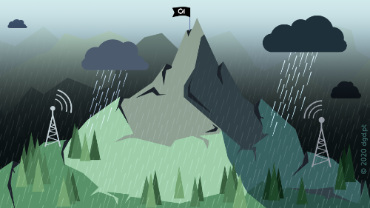DEC 18, 2020 · 20 MIN · remote digital agency
remote glossary: dictionary of remote work and agency terms

This glossary was originally published on December 18, 2020 and is regularly updated for accuracy, comprehensiveness and timeliness. Last update: January 3, 2022
With office routines disrupted across the globe, companies have moved a substantial part of their business operations online. Millions of corporate employees are now working remotely for at least the time being—if not permanently.
This sudden and unexpected transition to a home office has left many overwhelmed with uncertainty and overloaded with questions.
To make these challenging times at least a little easier for you and help you keep abreast of latest workplace trends and technologies, we have a little gift for you today: A handy glossary of key terms associated with remote work, compiled by our completely remote digital agency team.
You can either dive right into the remote glossary or jump directly to the following letters:
· A–E
· F–N
· O–U
· V–Z
2fa noun
Abbreviation for two-factor authentication.
2FA or multi-factor authentication is an authentication method that requires a user to provide a second authentication factor beyond the password—usually a security token or biometric factor. This adds an extra layer of cybersecurity protection when logging into personal accounts or applications. We recommend Authy!
A
all-remote adjective
See remote by default.
async adjective
Abbreviation for asynchronous.
Async communication does not happen in real-time. Contrary to synchronous communication, asynchronous communication is always documented and archived for future reference. The team members therefore do not need to respond instantly or be online all at the same time. Examples include email, voicemail or a company wiki.
async-first adjective
Async-first describes a model in which a company defaults to async communication, using synchronous communication only whenever necessary. The async-first concept not only empowers members of a completely remote team to work together efficiently, but it also promotes documentation and allows tracing back past decisions and discussions at any time.
asynchronous adjective
See async.
B
business wiki noun
See company wiki.
C
cloud (computing) noun
In a remote work context, the cloud refers to servers and services that can be accessed via the internet. A remote advertising agency often stores or shares information, files and documents in the cloud so that each of the remote team members can easily access them anytime and from anywhere.
co-located adjective
Compared to a hybrid team or a remote team, a co-located or on-site team is comprised of members that are all present at the same physical location, usually in the same building, office or room. Sharing the same workspace, face-to-face collaboration as well as in-person meetings can flow very naturally.
company wiki noun
Unlike a public wiki like Wikipedia, a company wiki is a private wiki that is accessible and editable by employees. Similar to a handbook, this central knowledge base may contain internal documentation about company processes, best practices and projects—all in one place and available to anyone via the cloud.
co-working space noun
A co-working space refers to an arrangement in which individual professionals of different companies are co-located in the same workspace. Apart from considerable cost savings due to a common infrastructure and shared office supplies, co-working spaces often host events and foster community, which can help workers avoid feelings of isolation.
cybersecurity noun
Cybersecurity involves the practice of protecting systems, networks, devices, programs and data from malicious attacks, damage and unauthorized access. With more and more companies transitioning to remote work, implementing effective company-wide cybersecurity measures such as 2FA and a VPN is becoming increasingly important to protect both employees and sensitive data.
D
deep work noun
Cal Newport, who initially coined the term in 2012, describes deep work as professional activity performed in a state of distraction-free concentration that pushes your cognitive capabilities to their limit. Avoiding the distractions in an open-plan office, our remote creative agency allows all e-ployees to focus on their individual task(s).
digidipity® brand name
Far more than the word mark of our parent brand, digidipity® is an amalgamation of the words digital and serendipity—referencing a fortunate digital accident and perfectly describing what we aspire to be for all those we work for and with. Discover the unbelievable story behind our award-winning brand and logo!
digital hangout noun
See virtual hangout.
digital nomad noun
A digital nomad uses the latest technology to perform a job while being completely location-independent. Rather than commuting to the corporate headquarters or a central office, a digital nomad is nomadic in nature, traveling independently and internationally while working remotely, be it as a freelancer or on a contractual basis.
distance work noun
See remote work.
distributed-first adjective
See remote-first.
distributed team noun
See remote team.
distributed work noun
See remote work.
dual-factor authentication noun
See 2FA.
E
e-ployees noun
Derived from the word employees, we refer to our team members as e-ployees. Without a single physical office, our remote marketing agency has been remote by default from the first day. The term e-ployees reflects the digitally connected nature of our remote team, which spans cultures, continents and time zones.
F
face-to-face adjective
Similar to a conventional in-person meeting, a face-to-face meeting is one where the participants are co-located in the same physical location. The main difference is that face-to-face meetings frequently describe meetings in which only two persons are present, oftentimes sitting close to each other and looking at each other’s face.
fear of missing out noun
See FOMO.
flexible work noun
In a flexible work arrangement, an organization normally provides the technology and the infrastructure required so that an employee can work from home or work from anywhere, be it temporarily or permanently. This often includes a laptop or desktop computer, a VPN and accessories such as a headset or webcam.
fomo noun
Abbreviation for fear of missing out.
FOMO describes the increasingly common anxiety of missing out on important tasks, approaching deadlines or exciting social events, which can often result in significant stress. Aside from isolation, the fear of missing out may be one of the most difficult-to-overcome challenges of remote work.
freelancer noun
A freelancer or freelance worker is a self-employed individual who works on various assignments for multiple clients at one time, without committing to any one particular employer. Freelancers typically charge either by the task or by the hour. The freelance economy, or gig economy, has seen almost exponential growth recently.
fully distributed adjective
See remote by default.
fully remote adjective
See remote by default.
future of work noun
Digitalization and globalization are rapidly changing the way we work and live. The future of work describes predictions about what workplaces and work habits might look like in the coming years. Read our outlook on the future of work from the perspective of a remote digital marketing agency for details!
G
gig economy noun
The gig economy describes a job market that is characterized by a prevalence of temporary and flexible work contracts as opposed to traditional permanent employment arrangements. In a gig economy, a company hires a freelancer or independent contractor for short-term and part-time tasks, or gigs, rather than a full-time employee.
H
hangout noun
See virtual hangout.
home office noun
A home office is a designated area in a person’s residence, often separate from family and living spaces, for business purposes. Very common among employees who work from home and remote workers in general, a home office usually features at least a desk, chair, computer or notebook, telephone and printer.
hybrid team noun
In contrast to a remote team, the majority of members on a hybrid team is co-located. Only a small percentage of the workforce is usually made up by employees that are scattered around the world and working remotely on a permanent basis—not infrequently as part of a WFA model.
I
in-person adjective
Involving someone’s physical presence. An in-person meeting refers to the conventional meeting where all participants are co-located in the same location. The opposite to an in-person meeting would be a virtual hangout or video conference as often used by remote team members in order to communicate across borders and continents.
information technology security noun
See cybersecurity.
isolation noun
Feeling isolated and disconnected is probably one of the biggest challenges for remote teams. We are social creatures, so it is only natural that a lack of face-to-face time for an extended period of time can be problematic and occasionally result in unique mental health challenges and feelings of loneliness.
L
location-independent adjective
Being location-independent means not being tied to any specific geographic location. Location independence has become a lifestyle of the digital nomad movement that supports the freedom and the ability to live and work from anywhere in the world. One benefit of remote work is that it supports a location-independent life.
loneliness noun
See isolation.
M
mfa noun
See 2FA.
mobile work noun
See remote work.
multi-factor authentication noun
See 2FA.
O
off-site adjective
Situated away from a particular site. Traditionally, off-site meetings often take place at rented conference rooms or similar external venues. Another very popular example would be an off-site retreat that brings the members of a remote team together in-person from all over the globe for team building and other activities.
on-site adjective
Taking place at a particular place. Contrary to off-site meetings, on-site meetings usually always happen in a co-located setting such as at a company’s headquarters or at the client’s offices. As a result of the global pandemic, companies all over the globe move(d) all their workforce from on-site to off-site.
one-on-one noun
Similar to a face-to-face meeting, a one-on-one is a scheduled meeting between two parties. The main difference is that one-on-ones do not require the participants to be co-located in the same location. One-on-ones allow managers to build rapport and trust among a remote team using tools like a video conference.
R
real-time adjective
See synchronous.
remote agency noun
A remote agency has no physical office. With a fully distributed and remote team, a remote agency can take on clients from anywhere in the world and leverage the benefits of remote working. Read our full post What is a remote agency? 10 benefits for employees and clients for details!
remote by default adjective
Remote by default describes an organizational model that has no physical office to commute to. This empowers the entire team to be completely location-independent and to work from home, from a co-working space or to work from anywhere. Also referred to with the terms all-remote, fully distributed and fully remote.
remote effect noun
Remote effect is a term coined by our REMOTE AGENCY that refers to the positive impact remote work can have: From revitalizing rural and local communities to providing opportunity to a diverse set of candidates, we believe remote work has the potential to become one of the world’s greatest equalizers.
The remote effect on a global scale will be the subject of a future blog post. Don’t miss it and sign up to our blog post alert now!
remote-first adjective
Contrary to organizations that are remote by default, remote-first companies oftentimes operate a physical workplace. However, no matter whether their team members work from home or from the company’s headquarters, remote work is the norm. This means that all workflows and communication are async, which guarantees all workers equal opportunities.
remote-friendly adjective
Most of the organizational processes in a remote-friendly company revolve around an office. In contrast to remote-first organizations, remote-friendly businesses often offer flexible work schedules for certain employees only. However, most workflows do not embrace the concept of remote work and most communication is normally happening in a synchronous way.
remote job noun
A remote job is one that can be done from anywhere—even outside of traditional offices. Employees are able to accomplish the majority of tasks and projects using only a computer and high-speed internet connection. Communication with supervisors and other remote team members usually happens via phone or video conference.
Are you looking for a remote job? Then head to our jobs page now!
remote-only adjective
See remote by default.
remote team noun
A remote team or distributed team is a group of professionals that is spread across offices or, in organizations that are remote by default, even across countries, time zones or continents. With highly diverse backgrounds and skillsets, remote teams collaborate on one or more unified project(s) and under one management.
remote wiki noun
See company wiki.
remote work noun
Remote work is the practice of working outside of a physical brick-and-mortar office, or off-site. Remote workers, who are oftentimes dispersed across continents and time zones, usually communicate and collaborate with team members using a combination of digital (cloud storage, instant messaging apps and video conference) and traditional technology (phone).
retreat noun
A retreat or team retreat is an event that is often held at an off-site location where executives and employees meet in person for team-building activities. Such retreats may happen once or several times a year and can be beneficial in building culture and strengthening communication among remote team members.
S
synchronous adjective
The opposite of async. Synchronous or real-time communication requires all participants to be available simultaneously, albeit not necessarily co-located in the same location. Due to the nature of a remote team, this form of communication can pose considerable logistical challenges. Examples include phone, video conference as well as face-to-face conversation.
T
team retreat noun
See retreat.
telecommuting noun
Similar to remote work, telecommuting or telework is the practice of completing work assignments from a location other than a central office. Taking advantage of modern telecommunications technology and tools like the internet, email, chat, video conference as well as phone, telecommuters do not commute to a place of work.
telework noun
See telecommuting.
two-factor authentication noun
See 2FA.
V
va noun
Abbreviation for virtual assistant.
A VA is a self-employed, independent professional who usually provides administrative assistance to clients from a home office or remote location, thereby freeing up time for entrepreneurs or small business owners. VA tasks can include making phone calls, planning travel arrangements or appointments and managing email.
Are you in need of a VA? How about a free consultation to discuss how our VAs can best support you in achieving your goals?
video call noun
See video conference.
video chat noun
See video conference.
video conference noun
A video conference allows participants to meet and collaborate in real time, thereby mimicking a face-to-face experience without the need to get together in person. For any hybrid team, remote team or virtual team with members in different locations, video conferences are vital and can help alleviate feelings of isolation.
video meeting noun
See video conference.
videotelephony noun
See video conference.
virtual assistant noun
See VA.
virtual hangout noun
A virtual hangout provides a space where a group of people can dial into a meeting to interact and socialize via video and audio. When a remote team is distributed across borders and geographies, a synchronous virtual hangout can often be a viable alternative to the logistically challenging in-person meeting.
virtual private network noun
See VPN.
virtual team noun
Similarly to a remote team, a virtual team can be distributed across headquarters or, in organizations that are remote by default, across countries, time zones or continents. The main difference is that virtual teams formally report to various managers rather than one, such as in a task force or committee.
vpn noun
Abbreviation for virtual private network.
A VPN establishes an encrypted connection to another network and acts almost like a secure and private tunnel between a user’s device and the internet. Virtual private networks enhance cybersecurity by allowing for sensitive data to be sent or received across shared and public networks.
W
web conference noun
See video conference.
wfa verb
Abbreviation for work from anywhere.
Just as WFH is becoming popular, another form of remote work is already emerging: In a WFA arrangement, employees are typically not only provided with the freedom to choose when and how they wish to work, but also where they would like to work from.
wfh verb
Abbreviation for work from home.
WFH describes an arrangement in which employees of co-located businesses may temporarily or permanently work from their place of residence, rather than reporting to the company’s offices. During the pandemic, many businesses have transitioned their whole workforce from the corporate headquarters to a work-from-home model.
wiki noun
See company wiki.
work from anywhere verb
See WFA.
work from home verb
See WFH.
work-life balance noun
Work-life balance is the equilibrium between professional life and personal life. Maintaining a healthy balance between work and life helps reduce stress and prevent fatigue and burnout. One of the benefits of working remotely is that it provides employees with the autonomy to design their lives for true work-life balance.
workation noun
Combining work and vacation, a workation or workcation describes a trip in which business and leisure are blended together. This usually entails working remotely while traveling, sightseeing or unwinding in an exotic location. The digital nomad lifestyle is a great and popular example of working and vacationing at the same.
workcation verb
See workation.
· · · ·
Have you been forced to embrace the world of remote work and digital communication? How did that transition go? Do you want to return to your office? Or do you work in a remote design agency and feel like you cannot keep up with the rapidly changing landscape? Would you like us to add a term to our remote dictionary/glossary? And what topic would you like us to cover next in our blog?
Share your stories in the comments below and let us find solutions together—and improve the lives of as many people as we can!
what is a remote agency? ten benefits for employees and clients
AUG 22, 2020 · 25 MIN · remote design agency
how to make remote work: overcoming remote agency challenges
NOV 20, 2020 · 30 MIN · remote marketing agency
YOUR VOICE
only together can we shape a better future
We are here to break boundaries and make the impossible possible for you! Get in touch with us or kindly request a free consultation or an instant quote through our contact form.







